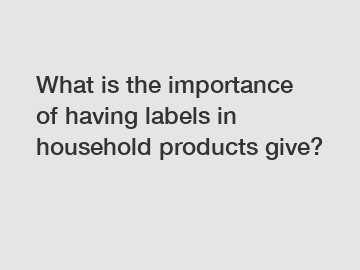What is the importance of having labels in household products give?
Having labels on household products is essential for ensuring safety, providing information, and promoting transparency. These labels provide vital details about the product, including ingredients, usage instructions, warnings, and important contact information. In this article, we will explore the importance of having labels on household products and how they benefit consumers.
**Safety**.
One of the primary reasons why labels on household products are crucial is for safety purposes. Many household products contain chemicals that can be harmful if not used properly. Labels provide important information regarding any potential hazards associated with the product, as well as instructions on how to use it safely. For example, cleaning products often include warnings about not mixing them with other chemicals to avoid dangerous reactions. By having labels that clearly outline safety precautions, consumers can protect themselves and their families from accidents or injuries.

**Information**.
Labels on household products also serve as a source of information for consumers. They provide details about the ingredients used in the product, allowing consumers to make informed decisions based on their preferences or sensitivities. For individuals with allergies or specific dietary requirements, labels play a crucial role in helping them identify products that are safe for use. Additionally, labels often include instructions on how to properly use and store the product, ensuring its effectiveness and longevity. Having access to this information empowers consumers to choose products that align with their needs and values.
**Transparency**.
Another significant benefit of having labels on household products is promoting transparency. Labels can provide insight into the manufacturing process, sourcing of ingredients, and any certifications or standards the product meets. This transparency fosters trust between consumers and manufacturers, as it demonstrates a commitment to quality and integrity. Consumers are increasingly seeking products that align with their values, such as sustainability or ethical production practices. Labels that disclose relevant information can help consumers make informed purchasing decisions that are in line with their beliefs.
**Compliance**.
In addition to safety, information, and transparency, labels on household products are also necessary for compliance with regulatory requirements. Government agencies often mandate specific information that must be included on product labels to ensure consumer safety and protection. For example, the Environmental Protection Agency (EPA) has guidelines for labeling pesticides, while the Food and Drug Administration (FDA) regulates labeling for food and pharmaceutical products. By following these regulations and including the required information on labels, manufacturers can demonstrate their commitment to compliance and uphold industry standards.
In conclusion, labels on household products play a critical role in ensuring safety, providing information, promoting transparency, and complying with regulations. Consumers rely on these labels to make informed choices about the products they use in their homes. By including clear and accurate labels on household products, manufacturers can build trust with consumers and demonstrate their commitment to quality and safety.
For more information about the importance of labels on household products, or if you have any questions about labeling requirements, please feel free to contact us.
For more luxury hardcover book printing, hardcover book printing with debossing, linen covers hardcover bookinformation, please contact us. We will provide professional answers.


